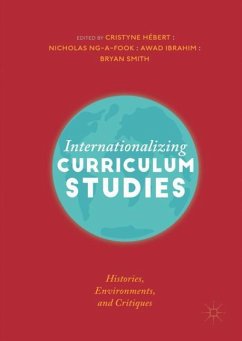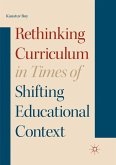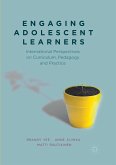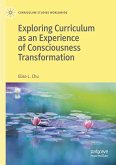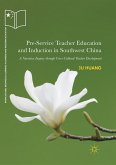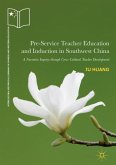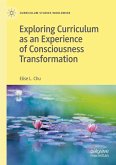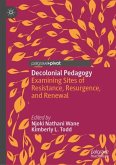Internationalizing Curriculum Studies
Histories, Environments, and Critiques
Herausgegeben:Hébert, Cristyne; Ng-A-Fook, Nicholas; Ibrahim, Awad; Smith, Bryan
Internationalizing Curriculum Studies
Histories, Environments, and Critiques
Herausgegeben:Hébert, Cristyne; Ng-A-Fook, Nicholas; Ibrahim, Awad; Smith, Bryan
- Gebundenes Buch
- Merkliste
- Auf die Merkliste
- Bewerten Bewerten
- Teilen
- Produkt teilen
- Produkterinnerung
- Produkterinnerung
This book seeks to understand how to internationalize curriculum without imperializing or imposing the old, colonial, and so-called first-world conceptualizations of education, teaching, and learning. The collection draws on the groundbreaking work of Dwayne Huebner in order to invite scholars into conversation with histories of curriculum studies and to posit them within it, opening up new spaces to work in and through curricular issues. This book will appeal to scholars, teachers, and students looking to reconceptualize international curriculum development and theory.
Andere Kunden interessierten sich auch für
![Rethinking Curriculum in Times of Shifting Educational Context Rethinking Curriculum in Times of Shifting Educational Context]() Kaustuv RoyRethinking Curriculum in Times of Shifting Educational Context67,99 €
Kaustuv RoyRethinking Curriculum in Times of Shifting Educational Context67,99 €![Engaging Adolescent Learners Engaging Adolescent Learners]() Brandy YeeEngaging Adolescent Learners43,99 €
Brandy YeeEngaging Adolescent Learners43,99 €![Exploring Curriculum as an Experience of Consciousness Transformation Exploring Curriculum as an Experience of Consciousness Transformation]() Elise L. ChuExploring Curriculum as an Experience of Consciousness Transformation56,99 €
Elise L. ChuExploring Curriculum as an Experience of Consciousness Transformation56,99 €![Pre-Service Teacher Education and Induction in Southwest China Pre-Service Teacher Education and Induction in Southwest China]() Ju HuangPre-Service Teacher Education and Induction in Southwest China52,99 €
Ju HuangPre-Service Teacher Education and Induction in Southwest China52,99 €![Pre-Service Teacher Education and Induction in Southwest China Pre-Service Teacher Education and Induction in Southwest China]() Ju HuangPre-Service Teacher Education and Induction in Southwest China56,99 €
Ju HuangPre-Service Teacher Education and Induction in Southwest China56,99 €![Exploring Curriculum as an Experience of Consciousness Transformation Exploring Curriculum as an Experience of Consciousness Transformation]() Elise L. ChuExploring Curriculum as an Experience of Consciousness Transformation43,99 €
Elise L. ChuExploring Curriculum as an Experience of Consciousness Transformation43,99 €![Decolonial Pedagogy Decolonial Pedagogy]() Decolonial Pedagogy52,99 €
Decolonial Pedagogy52,99 €-
-
-
This book seeks to understand how to internationalize curriculum without imperializing or imposing the old, colonial, and so-called first-world conceptualizations of education, teaching, and learning. The collection draws on the groundbreaking work of Dwayne Huebner in order to invite scholars into conversation with histories of curriculum studies and to posit them within it, opening up new spaces to work in and through curricular issues. This book will appeal to scholars, teachers, and students looking to reconceptualize international curriculum development and theory.
Produktdetails
- Produktdetails
- Verlag: Palgrave Macmillan / Springer International Publishing / Springer, Berlin
- Artikelnr. des Verlages: 978-3-030-01351-6
- 1st edition 2019
- Seitenzahl: 268
- Erscheinungstermin: 28. Januar 2019
- Englisch
- Abmessung: 216mm x 153mm x 20mm
- Gewicht: 466g
- ISBN-13: 9783030013516
- ISBN-10: 3030013510
- Artikelnr.: 53643252
- Herstellerkennzeichnung Die Herstellerinformationen sind derzeit nicht verfügbar.
- Verlag: Palgrave Macmillan / Springer International Publishing / Springer, Berlin
- Artikelnr. des Verlages: 978-3-030-01351-6
- 1st edition 2019
- Seitenzahl: 268
- Erscheinungstermin: 28. Januar 2019
- Englisch
- Abmessung: 216mm x 153mm x 20mm
- Gewicht: 466g
- ISBN-13: 9783030013516
- ISBN-10: 3030013510
- Artikelnr.: 53643252
- Herstellerkennzeichnung Die Herstellerinformationen sind derzeit nicht verfügbar.
Cristyne Hébert is Assistant Professor in the Faculty of Education at the University of Regina, Canada. Nicholas Ng-A-Fook is Professor and Director of the Teacher Education Program at the University of Ottawa, Canada. Awad Ibrahim is Professor in the Faculty of Education at the University of Ottawa, Canada. Bryan Smith is Lecturer at James Cook University, Townsville, Australia.
Chapter 1. Introduction, Cristyne Hébert, Awad Ibrahim, Nicholas Ng-A-Fook, and Bryan Smith.- Chapter 2. Towards a Complex Coherence in the Field of Curriculum Studies, Theodore M. Christou and Christopher DeLuca.- Chapter 3. Making Manifestos in Absentia: Of a World without Curriculum Theory, Molly Quinn and Niki Christodoulou.- Chapter 4. Curriculum Theory in Brazil: A Path in the Mists of the Xxi Century, Antonio Flávio Barbosa Moreira, and Rosane Karl Ramos.- Chapter 5. Talking Back to Second Language Education Curriculum Control, Douglas Fleming.- Chapter 6. A Phenomenography of Educators' Conceptions of Curriculum: Implication for Next Generation Curriculum Theorists' Contemplation and Action, Jazlin Ebenezer, Nicholas Sseggobe-Kiruma, Susan Harden, Russell Pickell and Suha Mohammed Hamden.- Chapter 7. Crossing Borders: A Story of Refugee Education, Karen Meyer, Cynthia Nicol, Siyad Maalim, Mohamud Olow, Abdikhafar Ali, Samson Nashon, Mohamed Bulle, Ahmed Hussein, Ali Hussein, and Hassan Hassan.- Chapter 8. Curriculum Theorists in the Classroom: Subjectivity, Crises, and Socioenvironmental Equity, Avril Aitken and Linda Radford.- Chapter 9. Curriculum for Identity: Narrative Negotiations in Autobiography, Learning, and Education, Eero Repo.- Chapter 10. High Passions: Affect and Curriculum Theorizing in the Present, Bessie Dernikos, Nancy Lesko, Stephanie D. McCall, and Alyssa D. Niccolini.- Chapter 11. The Power of Curriculum as Autobiographical Text: Insights from Utilizing Narrative Inquiry Self-Study in Research, Teaching, and Living, Carmen Shields.- Chapter 12. Nonviolence as a Daily Practice in Education: A Curriculum Vision, Hongyu Wang.- Chapter 13. Currere's Active Force and the Concept of Ubuntu, Lesley Le Grange.- Chapter 14. For Us, Today: Understanding Curriculum as Theological Text in the 21st Century, Rita Ugena Whitlock
Chapter 1. Introduction, Cristyne Hébert, Awad Ibrahim, Nicholas Ng-A-Fook, and Bryan Smith.- Chapter 2. Towards a Complex Coherence in the Field of Curriculum Studies, Theodore M. Christou and Christopher DeLuca.- Chapter 3. Making Manifestos in Absentia: Of a World without Curriculum Theory, Molly Quinn and Niki Christodoulou.- Chapter 4. Curriculum Theory in Brazil: A Path in the Mists of the Xxi Century, Antonio Flávio Barbosa Moreira, and Rosane Karl Ramos.- Chapter 5. Talking Back to Second Language Education Curriculum Control, Douglas Fleming.- Chapter 6. A Phenomenography of Educators' Conceptions of Curriculum: Implication for Next Generation Curriculum Theorists' Contemplation and Action, Jazlin Ebenezer, Nicholas Sseggobe-Kiruma, Susan Harden, Russell Pickell and Suha Mohammed Hamden.- Chapter 7. Crossing Borders: A Story of Refugee Education, Karen Meyer, Cynthia Nicol, Siyad Maalim, Mohamud Olow, Abdikhafar Ali, Samson Nashon, Mohamed Bulle, Ahmed Hussein, Ali Hussein, and Hassan Hassan.- Chapter 8. Curriculum Theorists in the Classroom: Subjectivity, Crises, and Socioenvironmental Equity, Avril Aitken and Linda Radford.- Chapter 9. Curriculum for Identity: Narrative Negotiations in Autobiography, Learning, and Education, Eero Repo.- Chapter 10. High Passions: Affect and Curriculum Theorizing in the Present, Bessie Dernikos, Nancy Lesko, Stephanie D. McCall, and Alyssa D. Niccolini.- Chapter 11. The Power of Curriculum as Autobiographical Text: Insights from Utilizing Narrative Inquiry Self-Study in Research, Teaching, and Living, Carmen Shields.- Chapter 12. Nonviolence as a Daily Practice in Education: A Curriculum Vision, Hongyu Wang.- Chapter 13. Currere's Active Force and the Concept of Ubuntu, Lesley Le Grange.- Chapter 14. For Us, Today: Understanding Curriculum as Theological Text in the 21st Century, Rita Ugena Whitlock

